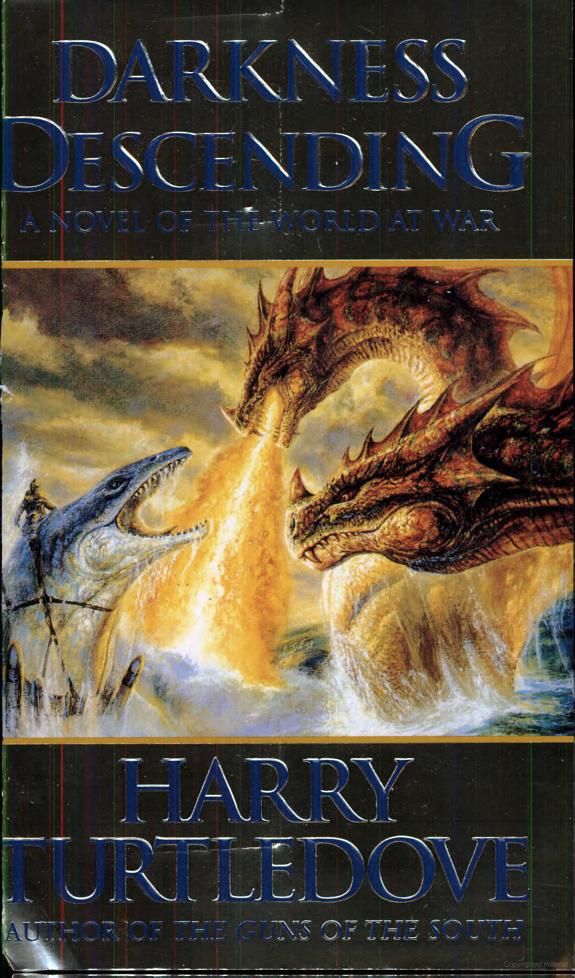
Turtledove, Harry - Darkness - 02 - Darkness Descending PDF
Preview Turtledove, Harry - Darkness - 02 - Darkness Descending
An epic mixture of fantasy and war In this sequel to the bestselling INTO THE DARKNESS, the country of Algarve is successful in its blitzkrieg tactics, but becomes bogged down in the desolate winter of Unkerlant, its main enemy. Algarve's king decides to undertake blood magic, which amounts to genocide, in order to break the deadlock; when it is seen to work, its use elsewhere cannot be long coming. On a small island, a theoretical sorcerer may hold the only answer to this horror...Harry Turtledove has taken events similar to those from Earth's wars and transplanted them to a wonderfully imagined fantasy world. his characters - of all nations and classes - live and breathe.
Amazon.com ReviewIn recent years, Harry Turtledove has specialized in alternate-history novels in which World War II, say, is grimly complicated by the arrival of invading alien reptiloids; the fantasy sequence that started with Into the Darkness and continues with Darkness Descendingis a powerful demonstration that it is human malice, not military technology, that we have to fear. Broadly speaking, the sequence replays World War II with magical fantasy empires in place of the participants we know; there are analogies between the fiercely militarist kingdom of Algarve and the Third Reich, just as the dangerous paranoid who rules the rival empire of Unkerlant has much in common with Joseph Stalin. There is a Manhattan project making military use of the underlying rules of magic, a particularly vicious version of the Holocaust, and a large cast of vividly realized viewpoint characters--Unkerlant's principal general, an Algarvian dragon pilot, various confused civilians--caught in the wheels of history. Turtledove provides some worryingly thoughtful material here about power and its consequences; his bleak use of stock fantasy images in a developed military contex--screaming unicorns caught in firestorms--is coarse-grained but unforgettable. --Roz Kaveney, Amazon.co.uk
From Publishers WeeklyTrust Turtledove to deliver plenty of grungy military action spiked with dollops of sex and a keen and accurate depiction of the realties of warfare. The sequel to his alternate history Into the Darkness is anything but easy going. Based on the horrors of the Eastern Front, where the Soviet Red Army fought to repel the Nazi invasion, the novel suffers from Turtledove's tendency to use names of one ethnic flavor to represent analogous characters of a totally different national group. For example, the Algarvians, the militant aggressors who closely resemble Nazis, bear Italian-sounding names and fight under a red, green and white flag. Given that there are 12 nations involved in this mortal conflict, and a cast of approximately 150 characters, this gets incredibly frustrating, especially since Turtledove abruptly shifts from site to site and employs magic in place of mid-20th-century technology (dragons as fighter aircraft, leviathans as submarines). When the Algarvians round up helpless Kaunians into "victory camps" where they will eventually be slaughtered for the vital energy needed to smite the Soviet-style enemies, the Unkerlanters, these foes retaliate by massacring their own peasantry to draw more energy themselves. This barbaric ante-raising causes the civilized, British-like Lagoans to observe that everyone involved will develop ever-increasing monsterlike strength before this world war comes to an end. Turtledove personalizes the conflict through 15 "viewpoint characters"(so-called in his extensive Dramatis Personae), including the gallant Algarvian dragonflier Colonel Sabrino; the elegant, conniving Kresta; and young lovers Vanai, a hunted Kaunian, and Ealstan, a decent bookkeeper. Everyone is brought to the brink of a Pearl Harbor-like entry by a slow-to-activate world power, leaving all--including Turtledove's readers--to slog through a lot more territory in likely future installments.
Copyright 2000 Reed Business Information, Inc.
